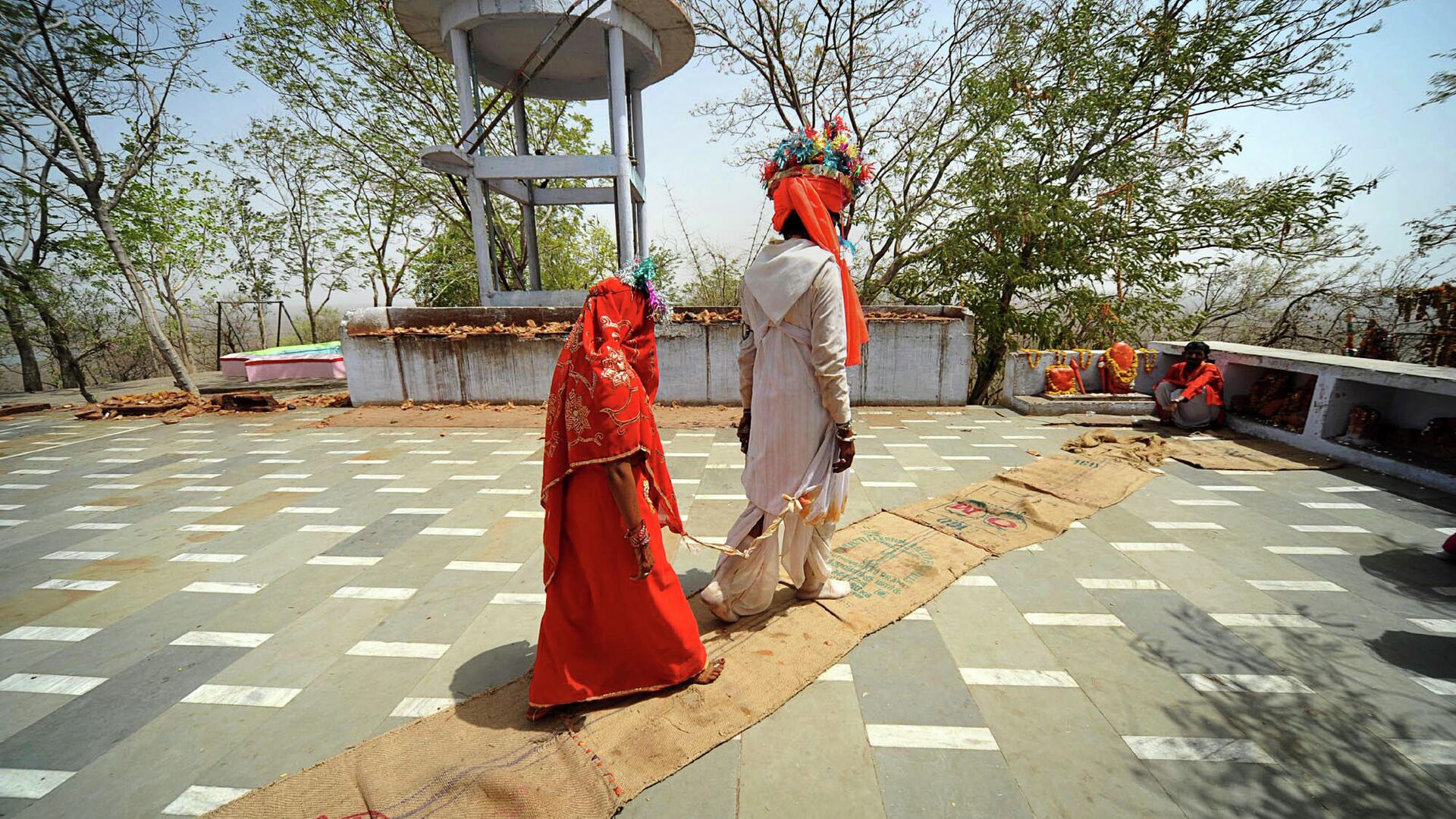https://sputnikglobe.com/20211125/child-marriage-in-india-remains-a-major-concern-national-survey-shows-1091013632.html
Child Marriage in India Remains a Major Concern, National Survey Shows
Child Marriage in India Remains a Major Concern, National Survey Shows
Sputnik International
Earlier this year, the international children’s charity World Vision issued a report titled ‘Breaking the Chain’, which suggested that the COVID-19 pandemic... 25.11.2021, Sputnik International
2021-11-25T13:13+0000
2021-11-25T13:13+0000
2022-12-10T11:40+0000
sputnik
society
sputnik
child marriage
child brides
social
https://cdn1.img.sputnikglobe.com/img/07e5/0b/19/1091016984_0:116:2000:1241_1920x0_80_0_0_449d22fbabb447345cf9e1a5d1463e58.jpg
A survey conducted by Federal Ministry of Health and Family Welfare has revealed that every fourth woman in the 20-24 age group was already married before turning 18.The National Family Health Survey-5 (2019-21) or, the NFHS-5 survey has also stated that underage marriages have declined from 26.8 per cent to 23.3 per cent in the last five years.The national survey, released on Wednesday, has also observed that the problem of child marriage is a major problem in rural areas of the country, where 27 percent of such marriages were reported in comparison to 14.7 percent in urban areas.The data also shows that 6.8 percent of girls aged between 15-19, were already mothers or pregnant at the time of survey. The rural-urban difference was prominent in this category also: 3.8 percent in urban areas versus 7.9 percent in rural areas.Men aged 25-29, who got married before the legally permissible age of 21, amounted to 21.1 percent of the total in rural areas, versus 11.3 percent in urban areas.Sputnik reached out to a noted women's rights activist to explore the reasons behind child marriages, their impact on women, and possible ways of preventing the phenomenon.While talking to Sputnik, Ranjana Kumari, the Director of the Centre for Social Research (CSR), a Delhi-based NGO, agreed that child marriage is a major concern in India and that the pandemic has pushed it more.Talking about the survey, she said that the NFHS-5 is a pre-pandemic survey but a report of the United Nations Population Fund that was released earlier this year suggested that COVID-19 is likely to result in 13 million additional child marriages.“Therefore, we have to wait for the post-pandemic survey and see what the exact situation is.”Citing other reasons behind child marriages, Kumari said that different parts of the country justify such marriages in different ways.Apart from these social stigmas, the economic condition of a lot of families is another compelling reason behind child marriages, Kumari said."By marrying the girls at an early age, the family thinks that they will get rid of the expenses to be made on her education as they don’t think that there would be any advantage because most of the time the girls don’t work.""Secondly, they think that by marrying their daughters they will be able to transfer the liability to another family,” she added.Asked about how child marriages/early age marriages can be stopped, the women's rights activists said that the NGOs are self-motivated organisations and depend on their own funds for everything, but the biggest responsibility is that of the federal government and state governments.She said that in villages as politicians attend the marriages, it makes the families feel they are right (or there is no harm in such a marriage).“Being a representative of the people, they should stop attending such marriages and take a pledge that no such marriage will be allowed in their constituencies. They should talk to the communities and make them understand the adverse impact of such marriages,” she added.Kumari also said that the government can stop it or control it at two levels, firstly at the level of implementation of the law through the strict monitoring and mobilisation of the local authorities, and secondly by sending the right political message.She suggested that the governments should launch some social initiatives like motivating the families to send more girls to the schools."There is a direct relation between education and child marriage. If the girls are studying then their marriage gets delayed. So, the government should actually act on it,” the women rights activist stated.
Sputnik International
feedback@sputniknews.com
+74956456601
MIA „Rossiya Segodnya“
2021
Rahul Trivedi
https://cdn1.img.sputnikglobe.com/img/07e5/05/12/1082926121_0:-1:627:627_100x100_80_0_0_d882e1a63f627c25b7a534fb8b8234d7.jpg
Rahul Trivedi
https://cdn1.img.sputnikglobe.com/img/07e5/05/12/1082926121_0:-1:627:627_100x100_80_0_0_d882e1a63f627c25b7a534fb8b8234d7.jpg
News
en_EN
Sputnik International
feedback@sputniknews.com
+74956456601
MIA „Rossiya Segodnya“
Sputnik International
feedback@sputniknews.com
+74956456601
MIA „Rossiya Segodnya“
Rahul Trivedi
https://cdn1.img.sputnikglobe.com/img/07e5/05/12/1082926121_0:-1:627:627_100x100_80_0_0_d882e1a63f627c25b7a534fb8b8234d7.jpg
sputnik, society, sputnik, child marriage, child brides, social
sputnik, society, sputnik, child marriage, child brides, social
Child Marriage in India Remains a Major Concern, National Survey Shows
13:13 GMT 25.11.2021 (Updated: 11:40 GMT 10.12.2022) Earlier this year, the international children’s charity World Vision issued a report titled ‘Breaking the Chain’, which suggested that the COVID-19 pandemic has the potential to put an extra four million girls at risk of early marriage. In developing countries like India, child marriage has been a harsh reality despite being banned for decades.
A survey conducted by Federal Ministry of Health and Family Welfare has revealed that every fourth woman in the 20-24 age group was already married before turning 18.
The National Family Health Survey-5 (2019-21) or, the NFHS-5 survey has also stated that underage marriages have declined from 26.8 per cent to 23.3 per cent in the last five years.
The national survey, released on Wednesday, has also observed that the
problem of child marriage is a major problem in rural areas of the country, where 27 percent of such marriages were reported in comparison to 14.7 percent in urban areas.
The data also shows that 6.8 percent of girls aged between 15-19, were already mothers or pregnant at the time of survey. The rural-urban difference was prominent in this category also: 3.8 percent in urban areas versus 7.9 percent in rural areas.
Men aged 25-29, who got married before the legally permissible age of 21, amounted to 21.1 percent of the total in rural areas, versus 11.3 percent in urban areas.
Sputnik reached out to a noted women's rights activist to explore the reasons behind child marriages, their impact on women, and possible ways of preventing the phenomenon.
While talking to Sputnik, Ranjana Kumari, the Director of the Centre for Social Research (CSR), a Delhi-based NGO, agreed that child marriage is a major concern in India and that the pandemic has pushed it more.
"Some research reports have revealed that a lot of girl children had to drop out of school due to lack of technology and loss of income of their families. In such a situation a lot of parents preferred to get their daughters married at an early age to protect their livelihood and dignity,” Kumari shared.
Talking about the survey, she said that the NFHS-5 is a pre-pandemic survey but a report of the United Nations Population Fund that was released earlier this year suggested that COVID-19 is likely to result in 13 million additional child marriages.
“Therefore, we have to wait for the post-pandemic survey and see what the exact situation is.”
Citing other reasons behind child marriages, Kumari said that different parts of the country justify such marriages in different ways.
“One common thread is that early age marriages ensure virginity or purity of a woman. In some parts of the country like Eastern Uttar Pradesh, Rajasthan, Madhya Pradesh, people think that a girl should be married when she starts menstruating,” CSR Director said.
Apart from these social stigmas, the economic condition of a lot of families is another compelling reason behind child marriages, Kumari said.
"By marrying the girls at an early age, the family thinks that they will get rid of the expenses to be made on her education as they don’t think that there would be any advantage because most of the time the girls don’t work."
"Secondly, they think that by marrying their daughters they will be able to transfer the liability to another family,” she added.
Asked about how child marriages/early age marriages can be stopped, the women's rights activists said that the NGOs are self-motivated organisations and depend on their own funds for everything, but the biggest responsibility is that of the federal government and state governments.
“A law is already in place against child marriages but still the menace is there. Early age marriage of a girl child is a violation of her rights so it is the responsibility of the states to protect it," Kumari suggested, adding "the members of political parties, be it ruling or the Opposition, should also motivate people to stop the practice of child marriage.”
She said that in villages as politicians attend the marriages, it makes the families feel they are right (or there is no harm in such a marriage).
“Being a representative of the people, they should stop attending such marriages and take a pledge that no such marriage will be allowed in their constituencies. They should talk to the communities and make them understand the adverse impact of such marriages,” she added.
Kumari also said that the government can stop it or control it at two levels, firstly at the level of implementation of the law through the strict monitoring and mobilisation of the local authorities, and secondly by sending the right political message.
She suggested that the governments should launch some social initiatives like motivating the families to send more girls to the schools.
"There is a direct relation between
education and child marriage. If the girls are studying then their marriage gets delayed. So, the government should actually act on it,” the women rights activist stated.


